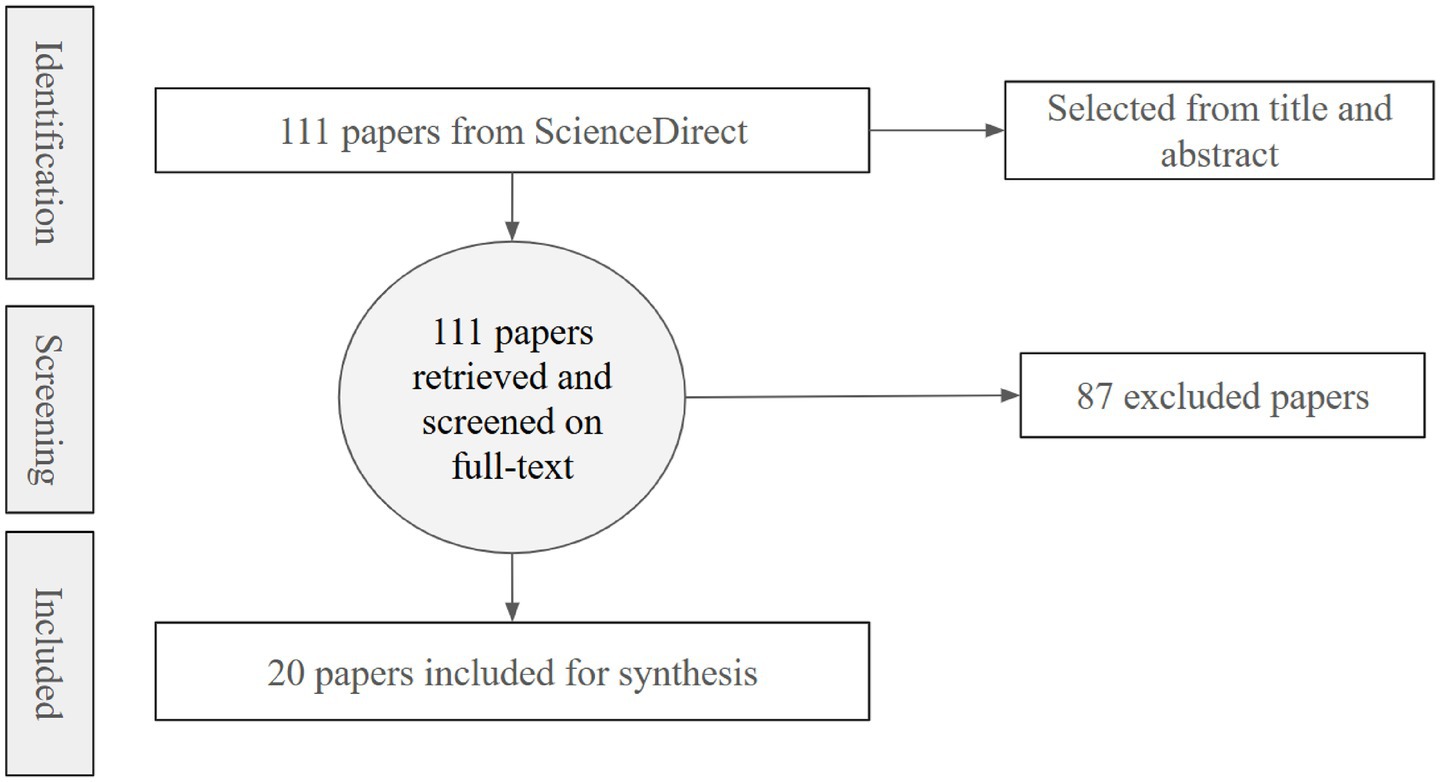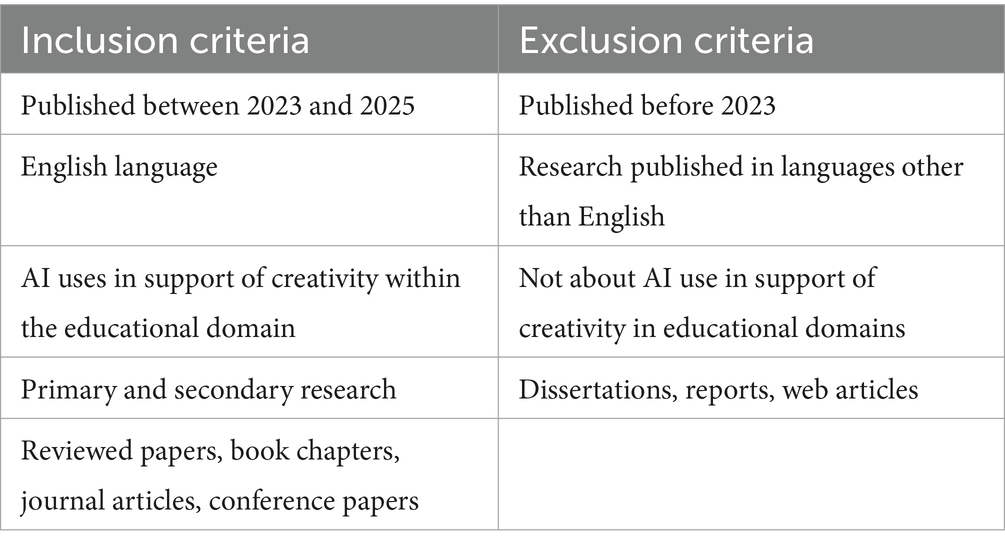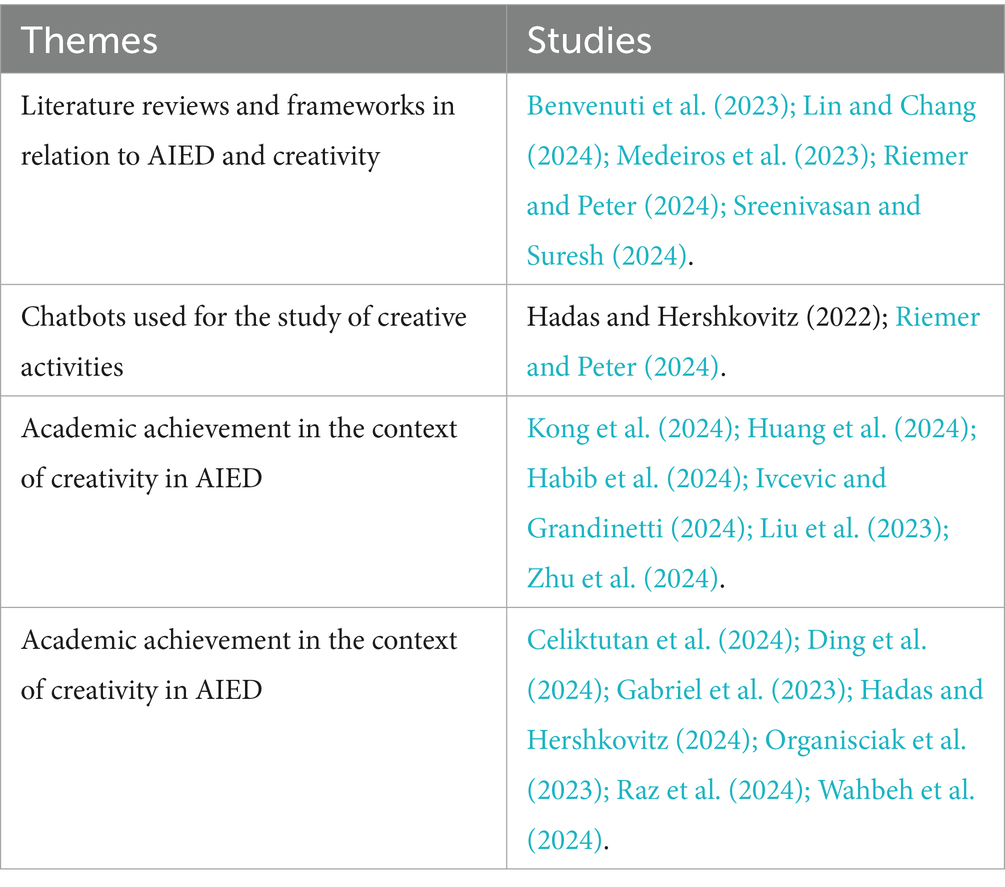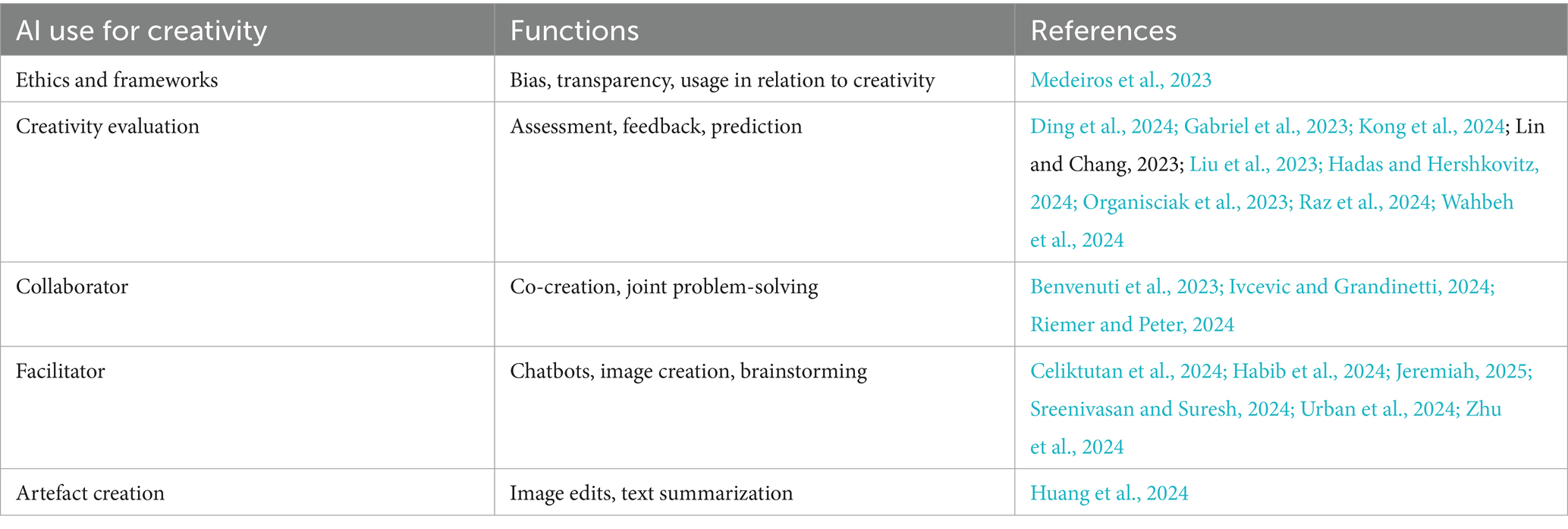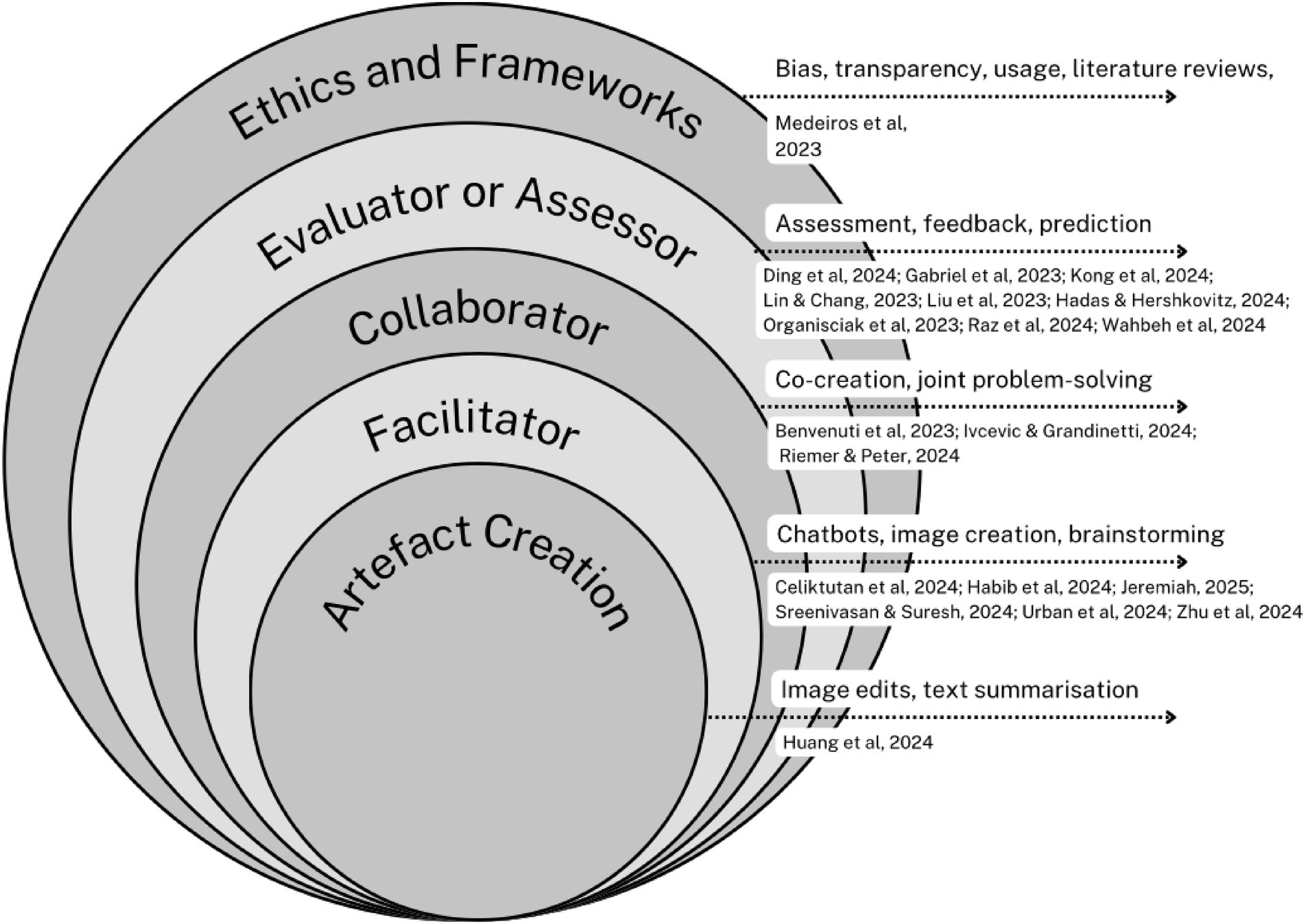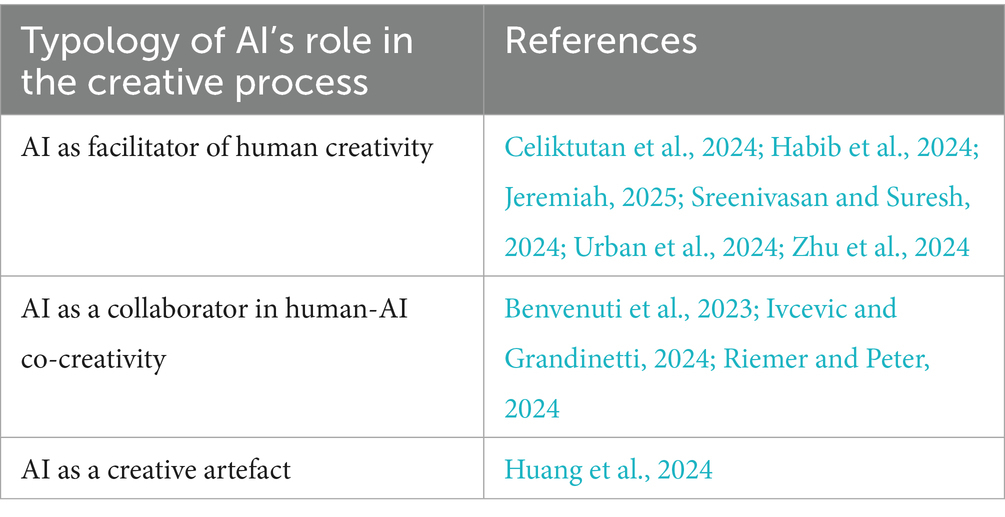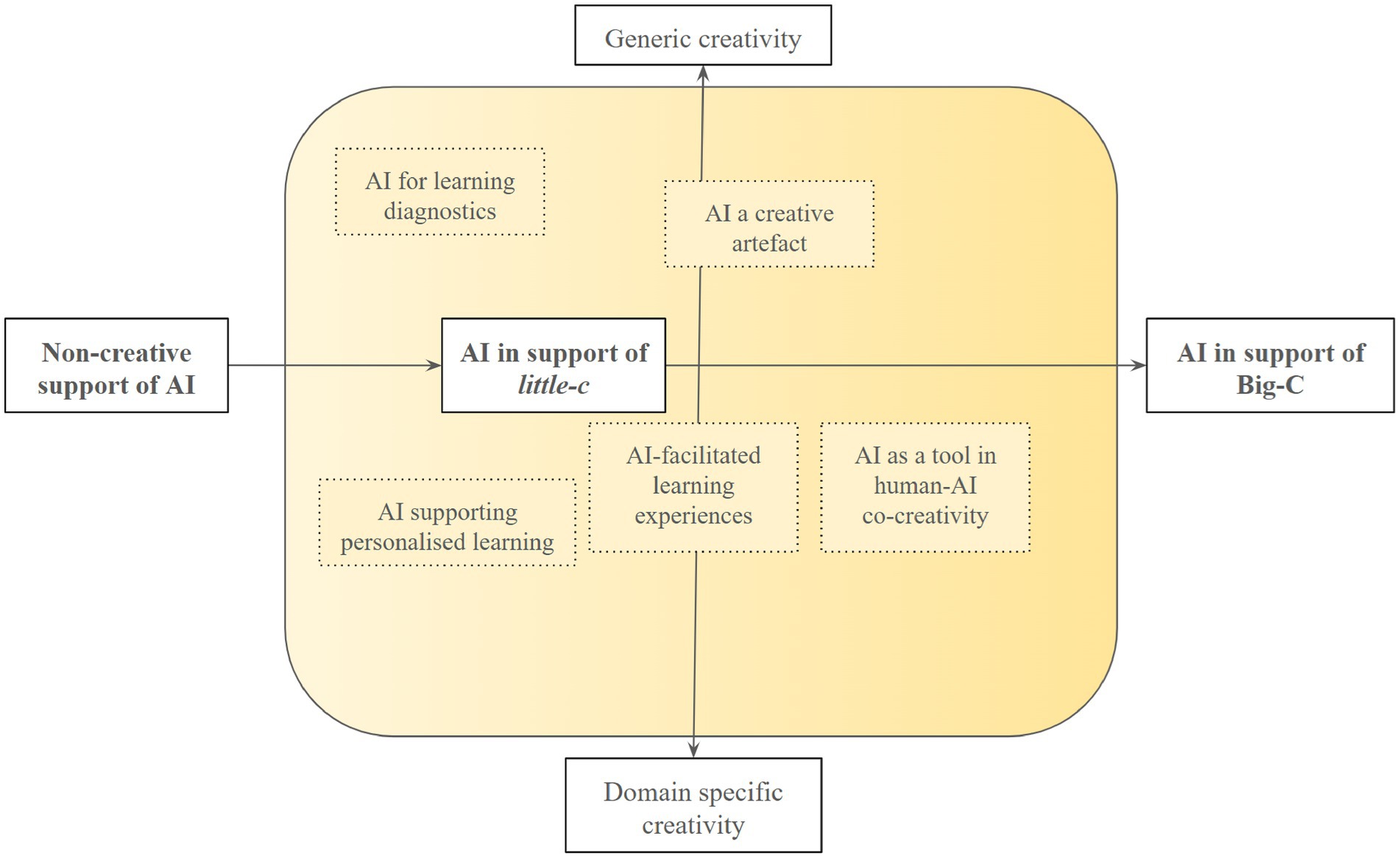- 1Université Côte d'Azur, Nice, France
- 2Universitat Internacional de Catalunya, Sant Cugat del Vallès, Spain
Creativity is considered an important competency for personal and professional development in the current society. With the integration of artificial intelligence (AI) in education, there is increasing interest in understanding how AI can support the creative process and how its usage in various contexts might affect user agency. Nevertheless, the specific role of AI in the support to the creative process is not clearly identified in the literature. To address this gap, a comprehensive PRISMA review of the existing research explored the different contexts and use cases for AI in support of creativity, identifying 20 articles from the ScienceDirect database after a systematic review of 111 research papers. The 20 selected papers identified 5 primary use cases for AI in support of creativity in educational settings including academic achievement, chatbots, diagnostics and evaluation, and literature reviews and frameworks. Of these use cases, the most common applications of AI tend to occupy a more passive role where it supports brainstorming, creative writing, and adaptive learning systems. In these instances, user agency is considered high as the user is actively leading the process. In situations where AI functions as a co-collaborator, human agency is reduced as AI takes on a more substantial role in the creative process. Domain and context also play a role in how AI is currently supporting creativity in educational settings. Generic domains support divergent thinking while more specific domains may reduce creative possibilities, but provide more structured support in the creative process.
Introduction
Creativity is considered a critical competency for success in the future economy and has been included in a number of educational frameworks highlighting transversal or 21st-century skills (Okada et al., 2025; OECD, 2019). Creativity is important because innovative tools, like artificial intelligence (AI), require citizens to develop their capacity to use technology to solve creative, collaborative, and complex problems (Benvenuti et al., 2023; OECD, 2019). While researchers have been advancing AI since the 1960s, the recent accessibility of AI-powered applications has brought AI into the mainstream, finding its way into a wide swath of contexts and use cases in the professional arena but also the educational one (Lee and Kwon, 2024). In education, AI permits support for personalised learning, data-driven decision-making for educators but also playful adaptive learning environments (Ng et al., 2024; Zhan et al., 2024). While there have been considerable efforts made to integrate AI into educational settings, questions remain as to how AI might support or even hinder certain cognitive processes in educational contexts. In this study, we focus on the role of AI in relation to creativity in educational tasks in order to better identify the opportunities but also the potential limits on the use of AI for supporting creativity in education.
Creativity is often thought of as a fixed ability that you either have or you do not. This has given rise over the years to the myth of the creative genius born with an innate creative talent that is unobtainable otherwise (Abraham, 2024). However, research has shown that creativity is a teachable process that is contextually driven by a number of internal and external factors (Sawyer and Henriksen, 2023). Moreover, creativity can be an individual or collective process depending on the task and domain (Authors). Understanding creativity as a domain-based regulated activity dispels the notion of innate talent while highlighting the role agency plays in the creative process. In this study, we aim to identify how the integration of AI can support creativity, and determine what role it might play in supporting little-c and Big-C creativity. Little-c creativity refers to everyday creativity, encompassing personal insights, problem-solving, and small-scale innovations that individuals engage in daily activities such as creative tasks in education (Ivcevic and Grandinetti, 2024). In contrast, Big-C creativity pertains to groundbreaking, domain-changing innovations that have a lasting impact on society.
Most of the current applications found in our review of AI in support of creativity function as assistive systems serving to enhance human ideation and problem-solving rather than producing novel, paradigm-shifting work (Habib, 2025; Medeiros et al., 2023; Zhu et al., 2024). It may be that AI excels at combinatorial creativity, given its ability to combine or remix existing ideas or knowledge, but remains bound by its training, algorithms, and lack of self-awareness from exhibiting truly transformational creativity (Boden, 2004). The diversity of the potential of AI to support the creative process raises research questions in relation to the use and role of AI in the creative process in education but also the specific role of AI in relation to the creative process. Our study aims to address this research gap through a Preferred Reporting Items for Systematic Reviews and Meta-Analyses (PRISMA, Sarkis-Onofre et al., 2021) methodology.
Research questions
To guide our investigation, we formulated the following research questions, aiming to explore the intersection of AI and creativity in educational contexts:
RQ1: What is the current use of AI and creativity in educational contexts?
RQ2: What is the AI’s role in the creative process?
RQ3: What role does AI play in supporting both little-c and Big-C creativity in education?
Method
We developed the literature review following the PRISMA guidelines. The search terms include “AI” OR “artificial intelligence,” ensuring the retrieval of literature related to artificial intelligence. To narrow the focus to educational contexts, the term “education” was included. Additionally, to capture studies related to creativity, the search incorporated “creativity” OR “creative process” OR “divergent thinking” to encompass various aspects of creative engagement.
We conducted the PRISMA review through the ScienceDirect database, selected for its high academic credibility and comprehensive coverage of peer-reviewed journals in the fields of computer science, education, and interdisciplinary studies. ScienceDirect integrates 1,570 peer-reviewed research journals that are also indexed in Scopus, Web of Science, PubMed, and Google Scholar. ScienceDirect database includes only peer-reviewed journals meeting the high-quality standards of research, not only in relation to bias risk but also in relation to the ethics of research. The query in ScienceDirect resulted in 111 research articles from peer-reviewed journals. The analysis of abstracts led to the exclusion of 87 papers because they did not study an educational activity in which AI supports creativity. An additional four articles were excluded because they did not include an educational focus. Following the inclusion criteria, 20 papers corresponded to the requirements of empirical studies analysing the support of AI in educational tasks.
We determined a set of criteria for the inclusion and exclusion of articles prior to the PRISMA search (see Table 1). Given the pace at which artificial intelligence is evolving, the decision was made to include articles in English published within the last 3 years, from 2023 to 2025. English publications were selected to avoid potential translation inaccuracies and due to translation constraints. We did not include any articles that did not look at how AI can help students be creative in school. Other articles were excluded if they were not peer-reviewed and products of primary or secondary research. We excluded dissertations, reports, and web articles. Two researchers developed the selection process. There were no discrepancies by following the factual exclusion criteria defined through the PRISMA guidelines. The results permitted the identification of a list of 20 articles, which were initially reviewed by the primary author for inclusion before being screened by a secondary author for accuracy. There were no disagreements between the two reviewers, and all 20 articles were then included in the final review.
Results
The research focus of the included articles included primary and secondary education (K12) (n = 7), Higher Education (HE) (n = 5), professional development (n = 2), and general mixed or adult education studies (n = 4). Two papers did not specify their research focus or constituted literature reviews. Authors were affiliated with a university body, mostly in the United States (30%, n = 6) and China (20%, n = 4). The majority of the reviewed articles were conducted collaboratively (95%, n = 19) with two authors (n = 5), three authors (n = 4), or more (n = 10).
The analysis of the 20 papers reveals that AI use cases for the support of creativity in educational settings are growing, but still constitute a sizable minority to the body of literature around AI use cases in more general applications. The twenty papers reflected in this review can be categorised in four themes (Table 2).
Studies focusing on literature reviews and frameworks (Benvenuti et al., 2023; Lin and Chang, 2024; Medeiros et al., 2023; Riemer and Peter, 2024; Sreenivasan and Suresh, 2024) examine the current body of research on AI’s role in fostering creativity in education. These works either synthesise existing findings or provide theoretical guidance on AI’s integration within creative educational contexts.
Research on chatbot applications in creative activities (Hadas and Hershkovitz, 2022; Riemer and Peter, 2024) explores the use of AI-driven tools, such as ChatGPT, Claude, and DALL-E, in facilitating and co-collaborating during the creative process. These studies highlight AI’s role as an interactive agent that supports ideation and content generation.
The intersection of academic achievement and creativity in AIED (Kong et al., 2024; Huang et al., 2024; Habib et al., 2024; Ivcevic and Grandinetti, 2024; Liu et al., 2023; Zhu et al., 2024) focuses on AI’s capacity to enhance learning outcomes. AI applications in this domain contribute to curriculum gap analysis, personalised learning experiences, and student feedback.
Studies on the evaluation of creativity (Celiktutan et al., 2024; Ding et al., 2024; Gabriel et al., 2023; Hadas and Hershkovitz, 2024; Organisciak et al., 2023; Raz et al., 2024; Wahbeh et al., 2024) investigate AI’s role in assessing creativity within educational settings. These applications primarily focus on evaluating standardised creativity tests or measures of divergent thinking rather than assessing the creative process itself.
Results of the current use of AI and creativity in educational contexts? (RQ1)
Having analysed the 20 papers in relation to the first research question (RQ1), we then analysed the use of AI in the support of creativity in different educational settings before analysing its specific role in the support of the creative process (RQ2). The categories are identified through a thematic analysis based on the roles of AI in Table 3 and represented in Figure 2.
The results indicate that AI plays multiple roles in supporting creativity in education, ranging from artefact creation to providing ethical frameworks for its use. At the most fundamental level, AI is employed for artefact creation, including tasks such as image editing and text summarisation (Huang et al., 2024). As a facilitator, AI applications such as chatbots and image-generation tools assist in brainstorming and creative ideation, enhancing students’ engagement in the creative process (Celiktutan et al., 2024; Habib et al., 2024; Jeremiah, 2025; Sreenivasan and Suresh, 2024; Urban et al., 2024; Zhu et al., 2024). AI also functions as a collaborator, contributing to co-creation and joint problem-solving, thereby shifting its role from a mere tool to an active creative partner (Benvenuti et al., 2023; Ivcevic and Grandinetti, 2024; Riemer and Peter, 2024). AI serves as an evaluator or assessor, offering feedback, assessing creativity, and predicting performance, which can helps educators and students refine their creative work (Ding et al., 2024; Gabriel et al., 2023; Kong et al., 2024; Lin and Chang, 2023; Liu et al., 2023; Hadas and Hershkovitz, 2024; Organisciak et al., 2023; Raz et al., 2024; Wahbeh et al., 2024). At the highest level, AI’s influence extends to ethics and frameworks, addressing concerns related to bias, transparency, and responsible usage within educational settings (Medeiros et al., 2023).
While the potential of AI in supporting creativity is significant, our analysis revealed critical challenges that accompany its integration. Seven papers in our review highlighted substantial concerns, including the ethical complexities of training algorithms, potential deskilling of students, risks of plagiarism and overuse, and the potential erosion of human agency (Benvenuti et al., 2023; Habib et al., 2024; Celiktutan et al., 2024; Liu et al., 2023; Huang et al., 2024; Urban et al., 2024; Zhu et al., 2024). These multifaceted challenges extend beyond mere technological considerations, representing deeper pedagogical and epistemological questions about the role of AI in educational creativity. The concerns resonate with broader discussions in educational technology, reflecting a nuanced understanding that technological innovation must be balanced with critical reflection (Authors).
Results on the AI’s role in the creative process (RQ2)
Our analysis of the role of AI in supporting and enhancing creativity observed three roles going from a passive tool to an active collaborator, raising fundamental questions regarding the nature of human-AI co-creativity (Colton et al., 2009). Figure 3 illustrates the different applications of AI in support of human creativity in education, highlighting where both AI and the user sit in the creative process.
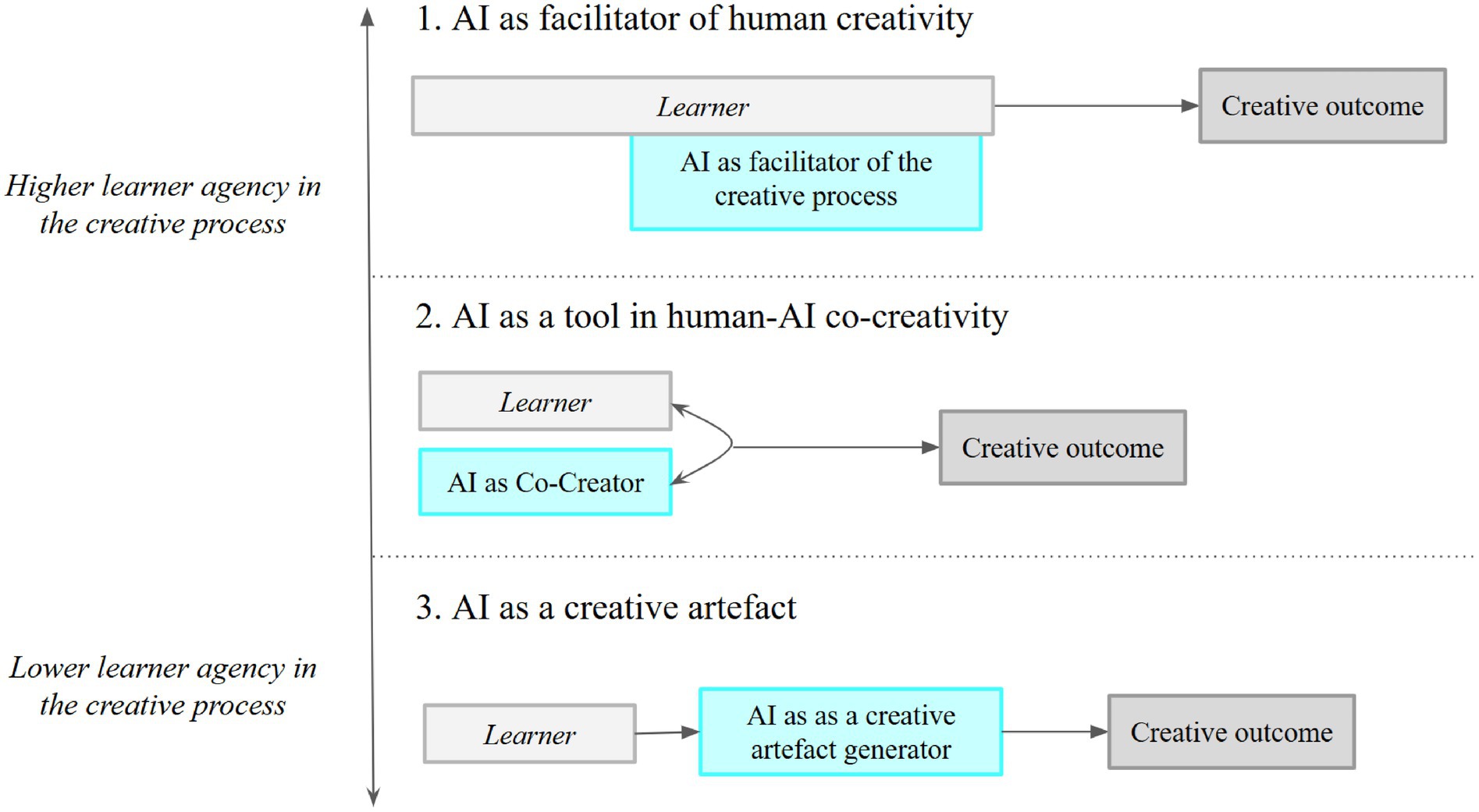
Figure 3. Typology of AI’s role in the creative process (Romero, 2025).
These use cases include three distinct modes of AI engagement, each characterised by varying levels of learner agency in the creative process. The first mode positions AI as a facilitator, where AI supports ideation and adaptive learning. In the second mode, AI is enacted as a co-creator between the learner and the AI system. The third mode represents AI as a creative artefact generator where the learner delegates creative tasks to the AI system. This has the potential to hinder learner agency. The AI role diversity in the leaner creative process is also dependent on the technological evolution of AI. The emerging landscape suggests a complex, dynamic interaction between human creativity and AI capabilities, challenging traditional conceptualisations of creative processes and demanding nuanced approaches to understanding and integrating AI in educational creative contexts. The analysis of the 20 studies of the PRISMA literature review is presented in Table 4.
Figure 4 comprehensively maps AI interventions across the creative process, identifing three distinct roles: AI as a facilitator of human creativity (Celiktutan et al., 2024; Habib et al., 2024; Jeremiah, 2025; Sreenivasan and Suresh, 2024; Urban et al., 2024; Zhu et al., 2024), AI as a collaborative partner in co-creativity (Benvenuti et al., 2023; Ivcevic and Grandinetti, 2024; Riemer and Peter, 2024), and AI as an autonomous creative artefact generator (Huang et al., 2024). These roles allow us to observe that AI’s involvement is not monolithic but dynamically distributed across multiple phases of the creative process, including ideation, development, and finalisation. At each stage, AI can augment, enhance, or even generate content, challenging traditional conceptualisations of creativity and technological mediation.
Results in the role AI plays in supporting both little-c and Big-C creativity in education (RQ3)
AI supports several different use cases in creative education, ranging from facilitator to co-creator to autonomous producer of creative artefacts. In each of these roles, AI provides differing levels of support to the creative process, moving from the assessment of creative output to personalising the learning process to serving as a co-collaborator and finally, generating creative outputs with minimal human involvement. This spectrum has a direct effect on user agency, where higher levels of AI support can reduce creative effort, but at the cost of reduced user agency. Context also plays a role as tasks associated with more generic domains serve to broaden creative possibilities and support divergent thinking. Conversely, tasks associated with more specific domains may reduce creative possibilities, but can scaffold expertise while providing more structured support (Habib et al., 2024). Domain also plays a role in AI’s support of Big-C and little-c creativity. Tasks associated with supporting understanding that fall in the specific domain can support little-c creativity, while co-creative collaboration within the generic domain is required to support Big-C creativity (Ivcevic and Grandinetti, 2024; Urban et al., 2024).
In Figure 4, we propose the differences in the domain specificity or genericity (axis horizontal) and the role of AI to support little-c and Big-C.
The results underscore that AI’s creative support is fundamentally contextual, varying significantly across generic and specific domains, and influencing both little-c and Big-C creativity (see Table 5). Across this spectrum, AI interventions directly modulate learner agency, with increased AI support paradoxically correlating with decreased human creative autonomy (Habib et al., 2024; Ivcevic and Grandinetti, 2024). In generic domains, AI demonstrates remarkable potential for broadening creative possibilities and supporting divergent thinking, as evidenced by speculative scenarios like Ivcevic and Grandinetti's (2024) projection of AI’s role in nurturing future breakthrough innovations. Conversely, in domain-specific contexts, AI functions more as a scaffolding mechanism, providing structured support that can systematically develop expertise while constraining creative exploration (Urban et al., 2024; Medeiros et al., 2023). This differential support is particularly pronounced between little-c creativity, where AI aids computational thinking and originality assessment, and Big-C creativity, where AI serves as a potentially transformative co-creative partner in complex domains like scientific and medical research. The findings suggest that the future of educational creativity lies not in replacing human creativity, but in developing increasingly sophisticated, context-aware AI collaborations that amplify rather than supplant human creative potential.
Discussion
We analysed three main research questions. In relation to the first research question (RQ1), the PRISMA review reveals AI’s multifaceted roles in supporting educational creativity, extending from practical artefact creation to sophisticated ethical frameworks. AI functions across four key dimensions: as an artefact generator (Huang et al., 2024), a facilitator of creative ideation (Celiktutan et al., 2024; Habib et al., 2024), a collaborative problem-solving partner (Benvenuti et al., 2023; Ivcevic and Grandinetti, 2024), and an evaluative tool providing feedback and creativity assessment (Ding et al., 2024; Gabriel et al., 2023). Critically, these roles transcend technological utility, addressing broader pedagogical considerations such as bias, transparency, and responsible implementation within educational contexts (Medeiros et al., 2023).
In relation to the role of AI in creativity (RQ2), we can observe three different types of roles supporting agency at different levels. In its role as a facilitator, AI enhances or supports the human creative process by providing tools, inspiration, or personalised guidance through the use of AI-powered brainstorming tools, creative writing assistants, and adaptive learning systems. At this level, user agency is considered high given that the user is actively driving the creative process while the role of AI is assistive rather than generative (Habib et al., 2024; Ivcevic and Grandinetti, 2024). When AI acts in human-AI co-creativity, AI takes on a more substantial role in the ideation process, actively shaping the direction of the creative output (McCormack et al., 2019; Urmeneta and Romero, 2024). Given the increased role played by AI, where AI-generated content moves beyond suggestion and is actively included in the creative process, human agency is reduced. Finally, the lowest level of user agency is reserved for instances when AI is used as a tool for producing creative artefacts. In this application, the user plays a minor role in the creative output, serving instead as an initiator or evaluator for mostly fully formed creative outputs. Examples of this include the creation of AI-generated images (DALL-E, Midjourney), AI-composed music (AIVA), and fully AI-generated stories (ChatGPT, Claude). Our review also identified an additional category where AI served as an evaluator of creativity-primarily through the evaluation of student work and surveys (Ding et al., 2024; Gabriel et al., 2023; Kong et al., 2024; Lin and Chang, 2024; Liu et al., 2023; Wahbeh et al., 2024) or creativity assessments such as the Alternative Uses Test (AUT) or the Divergent Association Task (DAT) (Hadas and Hershkovitz, 2024; Organisciak et al., 2023; Raz et al., 2024). The diversity of AI’s roles underscores a critical tension between learner agency and AI-driven automation, highlighting the imperative for nuanced, context-aware applications that amplify rather than supplant human creative potential. This multifaceted engagement necessitates ongoing scholarly attention to develop ethical frameworks and pedagogical strategies that can harness AI’s creative potential while preserving the fundamentally human essence of creative expression. Additionally, the analysis of the results for RQ2 shows that most research studies focus mainly on higher education or adult learners, which means K-12 students are not well represented. More studies are needed to look at how creative competencies develop over a learner’s lifespan and how learners access and use AI tools creatively based on their age and education level.
The analysis of AI’s role in supporting creativity (RQ3) reveals a nuanced spectrum of engagement across educational contexts. Our findings demonstrate that AI supports creativity through multiple modalities with varying implications for learner agency. The support differs significantly between generic and domain-specific contexts, with AI potentially broadening creative possibilities in generic domains while providing structured scaffolding in specific domains (Habib et al., 2024; Urban et al., 2024). Critically, the research highlights a fundamental trade-off: increased AI support correlates with decreased human creative autonomy, particularly across little-c and Big-C creativity contexts. The results suggest that effective AI integration in creative education requires carefully calibrated approaches that amplify rather than replace human creative potential.
The relationship between domain and the different applications of AI in support of creative education raises questions around learner autonomy and agency and what constitutes human-AI co-creativity (Habib et al., 2024; Kong et al., 2024; Zhu et al., 2024). Outside of levels of support, how does AI’s role differ when applied to specific and generic domains, and what trade-offs in human agency are deemed acceptable given the benefits associated with divergent thinking and creative effort. Given that the inclusion of AI in the creative process does not necessarily ensure novel or useful outcomes (Urban et al., 2024), particular attention should be paid to acculturation efforts that prioritise a critical approach to AI use where human agency is explicit and valued (Habib et al., 2024; Zhu et al., 2024).
Given the recency with which AI has become accessible to the general public, research around the long-term effects of AI on human creativity has yet to be determined. Additionally, GenAI’s ability to support creativity is dependent on the tool’s features and functionality. The rapid evolution of AI tools is, in itself, a limiting element of this review, and ongoing studies are required to update the state of AI support for the creative process in education. AI is often acknowledged for its ability to increase productivity and expand divergent thinking in support of creativity (Habib et al., 2024), while there may well be a degradation of skills when there is an overreliance on AI tools (Medeiros et al., 2023). This deskilling can also affect the ability to think critically, as the pervasiveness and availability of AI diminishes users’ moral judgement and creative criticism-undermining human autonomy and agency (Huang et al., 2024; Zhu et al., 2024). The potential benefits of AI in stimulating divergent thinking and expanding creative possibilities must be carefully weighed against the risks of skill degradation, reduced human agency, and the potential for AI to constrain rather than expand creative potential.
Data availability statement
Publicly available datasets were analyzed in this study. This data can be found at: Université Côte d’Azur repository.
Author contributions
AU: Writing – original draft, Investigation, Methodology, Writing – review & editing. MR: Project administration, Writing – original draft, Conceptualization, Investigation, Funding acquisition, Validation, Writing – review & editing, Formal analysis.
Funding
The author(s) declare that financial support was received for the research and/or publication of this article. This study was funded by the Horizon Europe “Augmented Intelligence for Pedagogically Sustained Training and Education” (augMENTOR). Grant agreement ID: 101061509.
Conflict of interest
The authors declare that the research was conducted in the absence of any commercial or financial relationships that could be construed as a potential conflict of interest.
Generative AI statement
The authors declare that Gen AI was used in the creation of this manuscript. Grammar revision of the text using the QuillBot tool.
Publisher’s note
All claims expressed in this article are solely those of the authors and do not necessarily represent those of their affiliated organizations, or those of the publisher, the editors and the reviewers. Any product that may be evaluated in this article, or claim that may be made by its manufacturer, is not guaranteed or endorsed by the publisher.
References
Benvenuti, M., Cangelosi, A., Weinberger, A., Mazzoni, E., Benassi, M., Barbaresi, M., et al. (2023). Artificial intelligence and human behavioral development: a perspective on new skills and competences acquisition for the educational context. Comput. Hum. Behav. 148:107903. doi: 10.1016/j.chb.2023.107903
Celiktutan, B., Klesse, A.-K., and Tuk, M. A. (2024). Acceptability lies in the eye of the beholder: self-other biases in gen AI collaborations. Int. J. Res. Mark. 41, 496–512. doi: 10.1016/j.ijresmar.2024.05.006
Colton, S., Mántaras, R., and Stock, O. (2009). Computational creativity: coming of age. AI Mag. 30, 11–14. doi: 10.1609/aimag.v30i3.2257
Ding, G., He, Y., Yi, K., and Li, S. (2024). Using the divergent association task to measure divergent thinking in Chinese elementary school students. Think. Skills Creat. 52:101503. doi: 10.1016/j.tsc.2024.101503
Gabriel, F., Marrone, R., and van Broekhoven, K. (2023). “Teaching and learning for creativity in science and mathematics” in Handbook of organizational creativity. eds. R. Reiter-Palmon and S. Hunter. 2nd ed. (Elsevier: Academic Press), 393–405.
Habib, F. A. B. (2025). Unveiling the role of educators' attitudes & intention toward artificial intelligence in teaching: a multi-dimensional analysis. Educ. Inf. Technol. 30, 12463–12487. doi: 10.1007/s10639-024-13271-0
Habib, S., Vogel, T., Anli, X., and Thorne, E. (2024). How does generative artificial intelligence impact student creativity? J. Creat. 34:100072. doi: 10.1016/j.yjoc.2023.100072
Hadas, E., and Hershkovitz, A. (2024). Using large language models to evaluate alternative uses task flexibility score. Think. Skills Creat. 52:101549. doi: 10.1016/j.tsc.2024.101549
Huang, K.-L., Liu, Y.-C., Dong, M.-Q., and Lu, C.-C. (2024). Integrating AIGC into product design ideation teaching: an empirical study on self-efficacy and learning outcomes. Learn. Instr. 92:101929. doi: 10.1016/j.learninstruc.2024.101929
Ivcevic, Z., and Grandinetti, M. (2024). Artificial intelligence as a tool for creativity. J. Creat. 34:100079. doi: 10.1016/j.yjoc.2024.100079
Jeremiah, F. (2025). The human-AI dyad: navigating the new frontier of entrepreneurial discourse. Futures 166:103529. doi: 10.1016/j.futures.2024.103529
Kong, S.-C., Cheung, M.-Y. W., and Tsang, O. (2024). Developing an artificial intelligence literacy framework: evaluation of a literacy course for senior secondary students using a project-based learning approach. Comput. Educ. Artif. Intell. 6:100214. doi: 10.1016/j.caeai.2024.100214
Lee, S. J., and Kwon, K. (2024). A systematic review of AI education in K-12 classrooms from 2018 to 2023: topics, strategies, and learning outcomes. Comput. Educ. Artif. Intell. 6:100211. doi: 10.1016/j.caeai.2024.100211
Lin, M.-Y., and Chang, Y.-S. (2024). Using design thinking hands-on learning to improve artificial intelligence application creativity: a study of brainwaves. Think. Skills Creat. 54:101655. doi: 10.1016/j.tsc.2024.101655
Liu, Z., Vobolevich, A., and Oparin, A. (2023). The influence of AI ChatGPT on improving teachers’ creative thinking. Int. J. Learn. Teach. Educ. Res. 22, 124–139. doi: 10.26803/ijlter.22.12.7
McCormack, J., Gifford, T., and Hutchings, P. (2019). Autonomy, authenticity, authorship and intention in computer generated art, London: Palgrave Macmillan. 35–50.
Medeiros, K. E., Marrone, R. L., Joksimovic, S., Cropley, D. H., and Siemens, G. (2023). “Promises and realities of artificial creativity” in Handbook of organizational creativity. eds. R. Reiter-Palmon and S. Hunter. 2nd ed (Elsevier: Academic Press), 275–289.
Ng, D. T. K., Su, J., Leung, J. K. L., and Chu, S. K. W. (2024). Artificial intelligence (AI) literacy education in secondary schools: a review. Interact. Learn. Environ. 32, 6204–6224. doi: 10.1080/10494820.2023.2255228
OECD (2019). “An OECD learning framework 2030” in The future of education and labor. eds. G. Bast, E. G. Carayannis, and D. F. J. Campbell (Cham, Switzerland: Springer International Publishing), 23–35.
Okada, A., Sherborne, T., Panselinas, G., and Kolionis, G. (2025). Fostering transversal skills through open schooling supported by the CARE-KNOW-DO pedagogical model and the UNESCO AI competencies framework. Int. J. Artif. Intell. Educ. 35, 1–46. doi: 10.1007/s40593-025-00458-w
Organisciak, P., Acar, S., Dumas, D., and Berthiaume, K. (2023). Beyond semantic distance: automated scoring of divergent thinking greatly improves with large language models. Think. Skills Creat. 49:101356. doi: 10.1016/j.tsc.2023.101356
Raz, T., Reiter-Palmon, R., and Kenett, Y. N. (2024). Open and closed-ended problem solving in humans and AI: the influence of question asking complexity. Think. Skills Creat. 53:101598. doi: 10.1016/j.tsc.2024.101598
Riemer, K., and Peter, S. (2024). Conceptualizing generative AI as style engines: application archetypes and implications. Int. J. Inf. Manag. 79:102824. doi: 10.1016/j.ijinfomgt.2024.102824
Romero, M. (2025). Des approches cognitives au pluralisme épistémologique pour l’étude de la résolution créative de problèmes et usages créatifs de l’IA. 2e Édition du Forum des Sciences Cognitives. Nice, France.
Sarkis-Onofre, R., Catalá-López, F., Aromataris, E., and Lockwood, C. (2021). How to properly use the PRISMA statement. Syst. Rev. 10:117. doi: 10.1186/s13643-021-01671-z
Sawyer, K., and Henriksen, D. (2023). Explaining creativity: the science of human innovation : Oxford University Press. doi: 10.1093/oso/9780197747537.001.0001
Sreenivasan, A., and Suresh, M. (2024). Design thinking and artificial intelligence: a systematic literature review exploring synergies. Int. J. Innov. Stud. 8, 297–312. doi: 10.1016/j.ijis.2024.05.001
Urban, M., Děchtěrenko, F., Lukavský, J., Hrabalová, V., Svacha, F., Brom, C., et al. (2024). ChatGPT improves creative problem-solving performance in university students: an experimental study. Comput. Educ. 215:105031. doi: 10.1016/j.compedu.2024.105031
Urmeneta, A., and Romero, M. (2024). Creative applications of artificial intelligence in education. London: Palgrave Macmillan.
Wahbeh, H., Cannard, C., Yount, G., Delorme, A., and Radin, D. (2024). Creative self-belief responses versus manual and automated alternate use task scoring: a cross-sectional study. J. Creat. 34:100088. doi: 10.1016/j.yjoc.2024.100088
Zhan, Z., Tong, Y., Lan, X., and Zhong, B. (2024). A systematic literature review of game-based learning in artificial intelligence education. Interact. Learn. Environ. 32, 1137–1158. doi: 10.1080/10494820.2022.2115077
Keywords: artificial intelligence, education, creativity, creative process, chatbots, divergent thinking
Citation: Urmeneta A and Romero M (2025) AI as a creative partner: a PRISMA review of AI’s role in supporting creativity in education. Front. Educ. 10:1602151. doi: 10.3389/feduc.2025.1602151
Edited by:
Amy Wanyu Ou, University of Gothenburg, SwedenReviewed by:
Ani Syafriati, Muhammadiyah University of Surakarta, IndonesiaOluwaseyi Aina Gbolade Opesemowo, University of Johannesburg, South Africa
Copyright © 2025 Urmeneta and Romero. This is an open-access article distributed under the terms of the Creative Commons Attribution License (CC BY). The use, distribution or reproduction in other forums is permitted, provided the original author(s) and the copyright owner(s) are credited and that the original publication in this journal is cited, in accordance with accepted academic practice. No use, distribution or reproduction is permitted which does not comply with these terms.
*Correspondence: Alex Urmeneta, YXVybWVuZXRAZ21haWwuY29t
 Alex Urmeneta
Alex Urmeneta Margarida Romero
Margarida Romero